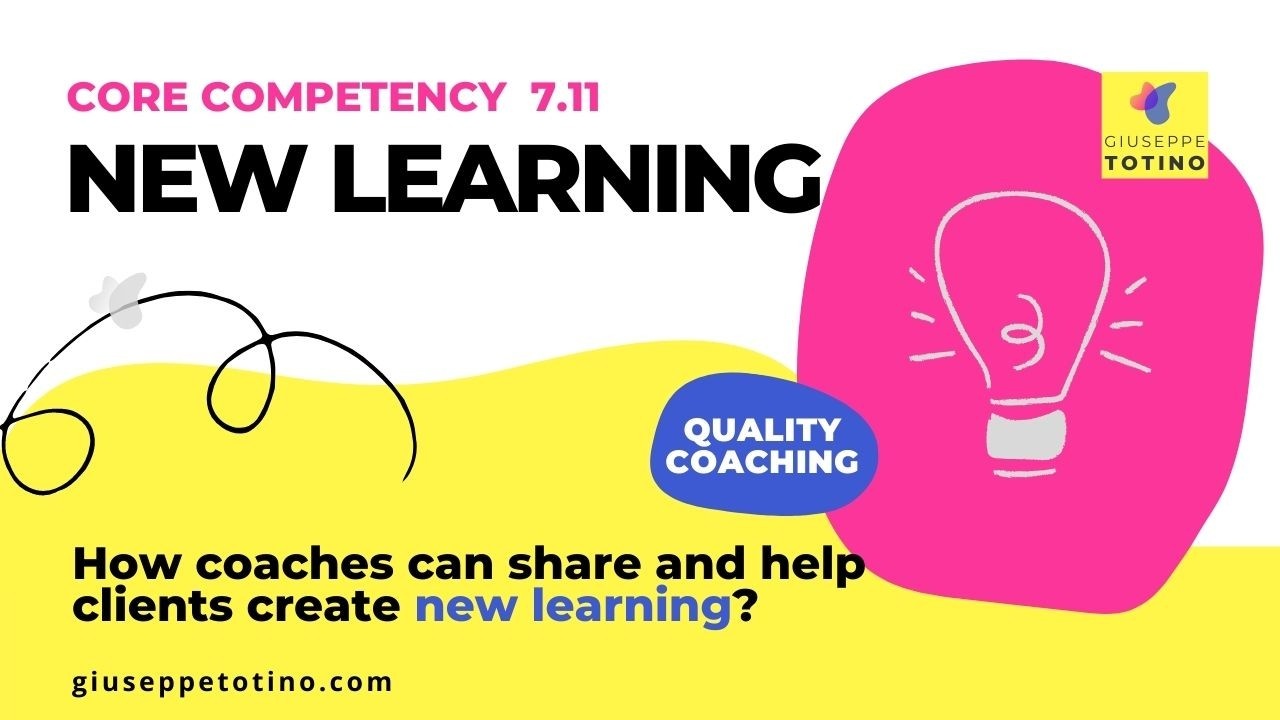How coaches can share and help clients create new learning?
Jan 14, 2021
Why is this important?
To show competence in the International Coaching Federation Core Competency 7.11. This blog is the fourth in a series where we explore how to demonstrate competence in C.C. 7.11, regarding how a coach can share thoughts, feelings, opinions, observations, etc. This post focuses on what it is and how to meet the ‘creating new learning’ requirement. In earlier blog posts, we examined whether a coach can share the coach’s thinking, opinions, and observations, non-attachment and how to meet it, and ‘the potential’ requirement. They are all components and requirements of sub-Core Competency 7.11.
In brief:
For a client to grow, there must be learning. Coaches facilitate the creation of new learning through coaching conversations. Coaches do not decide nor define what new learning is or when it happens. A coach satisfies Core Competency 7.11’s requirement of having the potential to ‘create new learning’ when the coach’s intent ( purpose) to share is to facilitate the client’s growth and expansion of awareness, rather than to limit the thinking or learning space, or worse even, celebrating the coach’s greatness. When applying for an ICF credential, my advice to show competence in this requirement of C.C. 7.11 is to invite the client into a broader learning and discovery space, away from the current story, thinking, or feeling. The invitation needs to be for a new or expanded thinking and creating space for possibilities, insights, awareness, and consciousness.
Problem:
The 2020 Sub-Core Competency 7.11 provides that the coach’s sharing must “have the potential to create new learning for the client”. Sub-Competency 7.11 does not explain the meaning of ‘new learning’ or illustrates how a coach can show competence in ‘creating’ new learning. So how can a coach meet this requirement?
Solution:
As discussed in an earlier post, sub-competency 7.11 requirements refer to both the purpose and the form of the coach’s sharing. In a previous post, we focused on the form. This post explores the last requirement of sub-competency 7.11: the coach’s purpose (or intention).
What purpose must the coach have?
When a coach shares an opinion, a thought, a feeling, an intuition, the coach must show the intention to support the client entering unchartered territory, where learning can occur. That is an unknown space of creation and discovery. Often clients experience therein what we commonly know as ‘aha moments’. When ‘aha moments’ occur, learning emerges for the clients. One primary reason clients engage coaches is to grow through learning.
How can a coach show this competence?
A coach must demonstrate that the coach uses the coach’s intuition, thinking, observation, emotional responses, etc., to facilitate the client’s growth. They may do so when they invite the client to enter a broader thinking space than they are in. The coach needs to show competence in inviting and allowing the client to discover new awareness, have new consciousness, gain insights, or see alternative possibilities for themselves or their situation.
The coach’s invitation may follow the coach sharing of their intuition, thoughts, or feelings. So a coach can artfully blend competencies to move clients into a space of new learning.
Must new learning be there to show competence?
No! Sub-competency 7.11 talks of ‘potential’. The coach must facilitate the creation of expansive space for the client. This competence is what an ICF Assessor would try to find out. Sub-competency 7.11 does not require new learning to be there. Neither it could! As it is unpredictable when learning occurs for a client, and only clients can effectively tell if it happens for themselves and what it is. But an assessor can observe and establish if a coach is competent in this competency area.
Are there variances among ACC, PCC, and MCC to consider?
Yes! There are. The ICF Minimum skills requirements for this competence (that are still current at the time of writing) expressly provide:
- For the ACC Coach: The coach uses coaching tools (like powerful questioning or inquiry) in a manner that encourages rather than limits exploration.
- For the PCC Coach: (2020 PCC Markers): The coach shares...observations, intuitions, comments, thoughts or feelings, and invites the client’s exploration through verbal or tonal invitation.
- For the MCC Coach: The coach’s communication frequently invites the client to engage in broader learning and discovery and to integrate and apply that learning and discovery not only to present challenges and agendas but also to the creation of the client’s future.
The emphasis is mine to show how expansive this skill is as the level of experience grows. It also reflects the differing level of evidence an ICF Assessor expects to collect when assessing this area of competence.
In earlier blogs, we established that a coach can share observations, feelings, thoughts, insights, etc., and that a coach needs to show no attachment to what the coach is sharing. We then clarified how to satisfy one additional requirement set forth by the ICF Sub Core Competency 7.11: the ‘potential’. This post covers the last remaining component of sub-competency 7.11, looking at the purpose of the sharing postulated in C.C. 7.11 and explores the final crucial requirement to share competently: ‘to create new learning’.
In our next blog post, we will explore how to show competence in Core Competency 2 - Embodies a Coaching Mindset.
Reference Material: 2019 ICF Core Competencies, 2020 PCC Markers, ICF Minimum Skills Requirements

The EASIER Mentor Coaching Programs
Are you planning to apply for or renew an ICF Credential? Do you need Mentor Coaching?
Explore our amazing Programs. We have designed programs with innovative approaches to learning and get ready for ICF Credentialing.
Stay connected with news and updates!
Join our mailing to receive valuable news, free resources, and mentor coaching contributions for a successful ICF ACC, PCC, and MCC Credentialing application or renewal.
We hate SPAM. We will never sell your information, for any reason.





